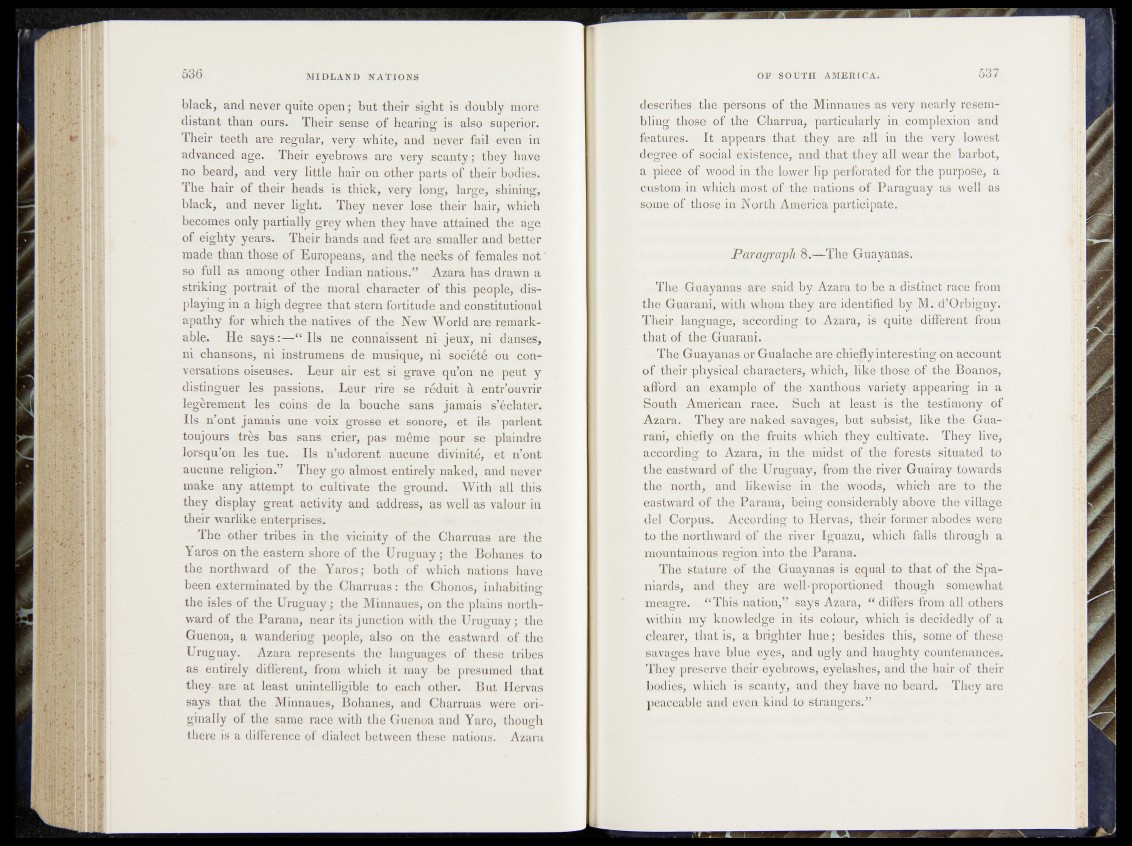
black, and never quite open ; but theiî sight is doubly more
distant than ours. Their sense of hearing is also •superior.
Their teeth ate regular, very white, and never fail even in
advanced'age. Their eyebrows are- very scanty; they, have
no beard, and very little hair on other parts of. their bodies.
The hair of their heads is thick, very long, large, shining,
black, and never light. They never lose their hair, which
becomes only partially grey when they have attained the age
of eighty years. Their hands and feet are smaller and better
mado than those of Europeans* and the necks of females not’
so full as among other Indian nations.’* .Azara has drawn a
striking portrait of the moral character of this people, dis-
playing in a high degree that stern fortitude, and constiàHtiosal
apathy for which the natives of the New World are remark-
able. He says :—“ Ils ne connaissent nir jeux, ni
ni chansons, ni jnstrumens de musique, ni société ou conversations
oiseuses, Leur air est si grave qu’on-me' peut y
distinguer les passions. Leur rire se réduit à eatr’oitvrir
légèrement les coins de la bouche sans jamais ^éclater,
Ils n’ont jamais une voix grosse et sonore, et ils parlent
toujours très bas sans crier, pas même pour
lorsqu’on les tue. Ils n’adorent aucune divinité, et n’ont
aucune religion.”. They go almost entirely naked, and never
make any attempt to cultivate the ground. With all this
they display great activity and address, as well as valour in
their warlike enterprises.
The other tribes in the vicinity of the Charmas are the
Yaros on the eastern shore of the Uruguay; the Bohanes to
the northward of the Yaros; both of which nations have
been exterminated by the Charmas: the Chonos, inhabiting
the isles of the Uruguay ; the Minnaues, on the plains northward
of the Parana, near its junction with the Uruguay ; the
Guenoa, a wandering people, also on the eastward of the
Uruguay. Azara represents the languages of these tribes
as entirely different, from which it may be presumed that
they- are at least unintelligible to each other. But Hervas
says that the Minnaues, Bohanes, and Charmas were originally
of the same race with the Guenoa and Yaro, though
there is a difference of dialect between these nations. Azara
describes- the persons of the Minnaues ;as- very nearly resembling.
thos^s.of idthsv Charrua, particularly in complexion and
feateu’i^^i;? It appears- that - thg^.^are all in the wery lowest
-degrefti©^social telti^te^e^iandijthat tb|sj|all wear the' barbot,
a, -in the purpose, a
customtin which•m^l^Mv'th^natl^s’iof-Paraguay as well as
some of. those ;in -Nf0h America? p’a-rtkipate.
l^-&,r,agrapli %-T-r^h.e Guayanas.'
--.The -Guayanm-i^aa-CCsaid foyAzUfu to^B^ti’di^tijiLetirace-from
the Guarani, with whom Aey^igfepdentified.IdjfcM.' d ’Or
Their language^ .aceardingtta Azara, is^quite different from
that: of the~,Guarani., |
The Guayanas orGualache are chiefly int^hslu^^onuceouht
of th^r- physical characters^'?whick, lifcetfcb^efpf'thet Boarios,
afford an example_of the. xanthoUtllVariety appearing in a
j8§ufch American race. &$uch at least"’*is '^ ^ e ^ tim e n y ie f
Azara. They are naked savages, but' sujbsist, like the Gua-
rani, chiefly on the Truits which they cultivated Theysdfvb
according,,to * Azara, in the niklst Jof the^lforbste^Situatted to
the eastward of theUruguay, from the--river Guairay towards
thfe. fforth* and likewise^an. ^the^woods, which are to' the
eastward of the Parana, beingiconsiderably'nb$^ the?-village
dei Corpus. According to Hervas, thei^-former«4^|wiC^|rere
to the northward of the river Iguazu, which- falls through a
mountainous- region into the Parana.
The stature of the Guayanas is equal to-that’of the Spaniards,
and they are well-proportioned thougttfsbmewhat
meagre. “This nation,” says Azara, “ differs from all others
within my knowledge in its colour, which is decidedly of5'a
clearer, that is, a brighter hue; besides this, someiOf these
savages have blue eyes*' and Ugly and haughty countenances-
They preserve their eyebrows,-eyelashes, anfftifo* hair of their
bodies, which is scanty, and they have no beard. They are
peaceable and even kind to strangers.”